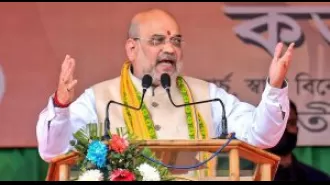Leaders in the community talk about Arizona's removal of Black history.
Podcast guests discuss the erasure of Black history in Arizona during a roundtable conversation on Valley 101.
July 10th 2024.

It has come to the attention of community leaders in Arizona that there is a deliberate effort to erase the rich history and significant contributions of Black Arizonians. In 2022, Assistant Professor Meskerem Glegziabher from Arizona State University published an essay discussing the erasure of Black history in the state and how it has been forgotten over time.
In her essay, Glegziabher emphasizes how Black people, whether they are African American or immigrants, are often viewed as outsiders and are excluded from narratives about Arizona's past, present, and future. She also raises concerns about the erasure of Black historical sites in Arizona's metropolitan cities, which she discussed in an interview with Arizona State University.
Glegziabher highlights two notable landmarks that have been demolished in recent years - the Rice Hotel and the former Booker T. Washington Hospital. The Rice Hotel was a significant establishment as it was one of the few accommodations in downtown Phoenix that welcomed African Americans. It was even listed in the "Negro Motorist Green Book" in 1940. However, it was torn down, along with other businesses, to make way for Chase Field. The former Booker T. Washington Hospital, opened in 1921 by the city's first Black physician, Dr. Wilson Hackett, was also demolished and is now an empty lot.
While the demolition of these landmarks may have been unrelated, their absence from the city's geography is seen as a larger issue of the state's history being sanitized and excluded from national narratives of Jim Crow and racial segregation. This is often done by mistakenly mapping a North-South binary. Glegziabher's concerns have been echoed by other community leaders in Arizona, who have joined the conversation she brought to light.
In an episode of Arizona Central's Valley 101 podcast, Pastor Warren Stewart, Chanel Powe, Anthony Pratcher II, and Jessica Salow discussed the issue of Black history erasure in a roundtable discussion. Stewart, who played a crucial role in making Martin Luther King Jr. Day a state holiday, pointed out that there is a wealth of African American history in Arizona that has been overlooked. He also raised the issue of systemic racism, where white historians often view white history as the standard, making it a priority over other histories.
Powe, who moved to Arizona from Detroit, shared similar concerns about the erasure of Black historical landmarks in the state. She mentioned Malinda Curtis, a Black woman who lived in Arizona in the late 1800s or early 1900s and was a pillar of her community. However, Powe only learned about her through a 70-foot-tall mural in downtown Phoenix, which was the largest mural in the area. She questioned why it is so challenging to find information about Malinda and how it must be even more challenging for Black families who have lived in Arizona for generations.
Pratcher II also addressed the erasure of figures like Richard E. Harris, one of the first Black historians and reporters hired by the Arizona Republic. He emphasized the importance of institutions and communities having a close relationship and pointed out the decline in the number of Black state legislators since 1952.
Salow, an assistant archivist at ASU, added to the conversation by highlighting the erasure of ASU's first Black male graduate, Benton James. She mentioned how difficult it has been to find information about him and questioned why institutions are not taking the time to connect the dots and bring light to Black history.
Despite these concerns, the discussion ended on a hopeful note as Stewart expressed his optimism for the future of Arizona. He acknowledged the reality of the racist system but found hope in the talented and gifted individuals who joined the conversation. He passed the baton to them, believing that they are the future and will bring about the change needed to recognize and honor the Black history of Arizona.
In her essay, Glegziabher emphasizes how Black people, whether they are African American or immigrants, are often viewed as outsiders and are excluded from narratives about Arizona's past, present, and future. She also raises concerns about the erasure of Black historical sites in Arizona's metropolitan cities, which she discussed in an interview with Arizona State University.
Glegziabher highlights two notable landmarks that have been demolished in recent years - the Rice Hotel and the former Booker T. Washington Hospital. The Rice Hotel was a significant establishment as it was one of the few accommodations in downtown Phoenix that welcomed African Americans. It was even listed in the "Negro Motorist Green Book" in 1940. However, it was torn down, along with other businesses, to make way for Chase Field. The former Booker T. Washington Hospital, opened in 1921 by the city's first Black physician, Dr. Wilson Hackett, was also demolished and is now an empty lot.
While the demolition of these landmarks may have been unrelated, their absence from the city's geography is seen as a larger issue of the state's history being sanitized and excluded from national narratives of Jim Crow and racial segregation. This is often done by mistakenly mapping a North-South binary. Glegziabher's concerns have been echoed by other community leaders in Arizona, who have joined the conversation she brought to light.
In an episode of Arizona Central's Valley 101 podcast, Pastor Warren Stewart, Chanel Powe, Anthony Pratcher II, and Jessica Salow discussed the issue of Black history erasure in a roundtable discussion. Stewart, who played a crucial role in making Martin Luther King Jr. Day a state holiday, pointed out that there is a wealth of African American history in Arizona that has been overlooked. He also raised the issue of systemic racism, where white historians often view white history as the standard, making it a priority over other histories.
Powe, who moved to Arizona from Detroit, shared similar concerns about the erasure of Black historical landmarks in the state. She mentioned Malinda Curtis, a Black woman who lived in Arizona in the late 1800s or early 1900s and was a pillar of her community. However, Powe only learned about her through a 70-foot-tall mural in downtown Phoenix, which was the largest mural in the area. She questioned why it is so challenging to find information about Malinda and how it must be even more challenging for Black families who have lived in Arizona for generations.
Pratcher II also addressed the erasure of figures like Richard E. Harris, one of the first Black historians and reporters hired by the Arizona Republic. He emphasized the importance of institutions and communities having a close relationship and pointed out the decline in the number of Black state legislators since 1952.
Salow, an assistant archivist at ASU, added to the conversation by highlighting the erasure of ASU's first Black male graduate, Benton James. She mentioned how difficult it has been to find information about him and questioned why institutions are not taking the time to connect the dots and bring light to Black history.
Despite these concerns, the discussion ended on a hopeful note as Stewart expressed his optimism for the future of Arizona. He acknowledged the reality of the racist system but found hope in the talented and gifted individuals who joined the conversation. He passed the baton to them, believing that they are the future and will bring about the change needed to recognize and honor the Black history of Arizona.
[This article has been trending online recently and has been generated with AI. Your feed is customized.]
[Generative AI is experimental.]
0
0
Submit Comment





